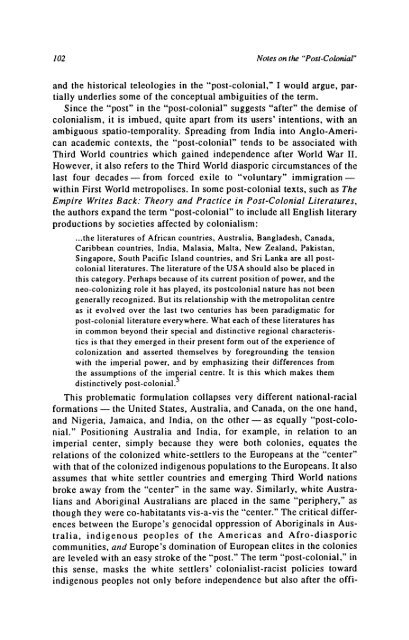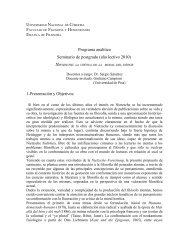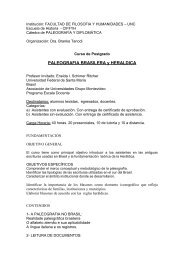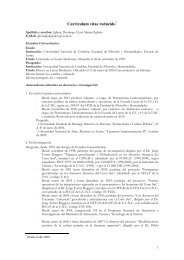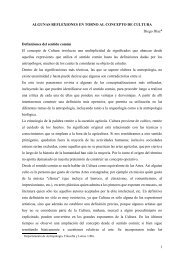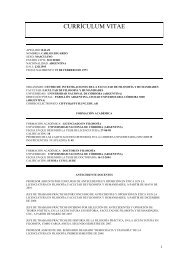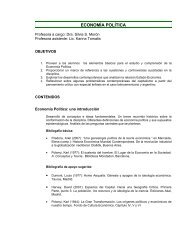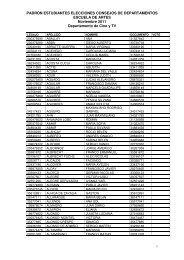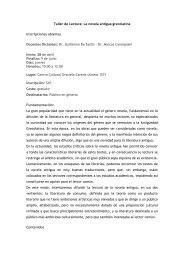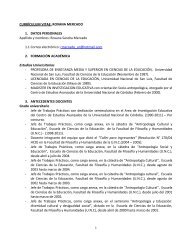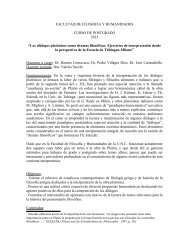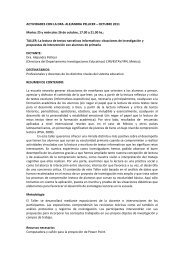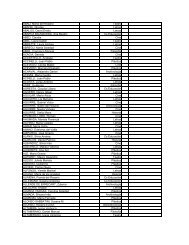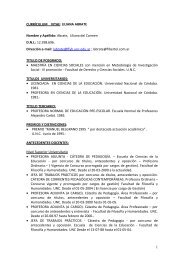Notes on the "Post-Colonial" Author(s): Ella Shohat Source: Social ...
Notes on the "Post-Colonial" Author(s): Ella Shohat Source: Social ...
Notes on the "Post-Colonial" Author(s): Ella Shohat Source: Social ...
You also want an ePaper? Increase the reach of your titles
YUMPU automatically turns print PDFs into web optimized ePapers that Google loves.
102<str<strong>on</strong>g>Notes</str<strong>on</strong>g> <strong>on</strong> <strong>the</strong> "<strong>Post</strong>-Col<strong>on</strong>ial"and <strong>the</strong> historical teleologies in <strong>the</strong> "post-col<strong>on</strong>ial," I would argue, partiallyunderlies some of <strong>the</strong> c<strong>on</strong>ceptual ambiguities of <strong>the</strong> term.Since <strong>the</strong> "post" in <strong>the</strong> "post-col<strong>on</strong>ial" suggests "after" <strong>the</strong> demise ofcol<strong>on</strong>ialism, it is imbued, quite apart from its users' intenti<strong>on</strong>s, with anambiguous spatio-temporality. Spreading from India into Anglo-Americanacademic c<strong>on</strong>texts, <strong>the</strong> "post-col<strong>on</strong>ial" tends to be associated withThird World countries which gained independence after World War II.However, it also refers to <strong>the</strong> Third World diasporic circumstances of <strong>the</strong>last four decades - from forced exile to "voluntary" immigrati<strong>on</strong> -within First World metropolises. In some post-col<strong>on</strong>ial texts, such as TheEmpire Writes Back: Theory and Practice in <strong>Post</strong>-Col<strong>on</strong>ial Literatures,<strong>the</strong> authors expand <strong>the</strong> term "post-col<strong>on</strong>ial" to include all English literaryproducti<strong>on</strong>s by societies affected by col<strong>on</strong>ialism:...<strong>the</strong> literatures of African countries, Australia, Bangladesh, Canada,Caribbean countries, India, Malasia, Malta, New Zealand, Pakistan,Singapore, South Pacific Island countries, and Sri Lanka are all postcol<strong>on</strong>ialliteratures. The literature of <strong>the</strong> USA should also be placed inthis category. Perhaps because of its current positi<strong>on</strong> of power, and <strong>the</strong>neo-col<strong>on</strong>izing role it has played, its postcol<strong>on</strong>ial nature has not beengenerally recognized. But its relati<strong>on</strong>ship with <strong>the</strong> metropolitan centreas it evolved over <strong>the</strong> last two centuries has been paradigmatic forpost-col<strong>on</strong>ial literature everywhere. What each of <strong>the</strong>se literatures hasin comm<strong>on</strong> bey<strong>on</strong>d <strong>the</strong>ir special and distinctive regi<strong>on</strong>al characteristicsis that <strong>the</strong>y emerged in <strong>the</strong>ir present form out of <strong>the</strong> experience ofcol<strong>on</strong>izati<strong>on</strong> and asserted <strong>the</strong>mselves by foregrounding <strong>the</strong> tensi<strong>on</strong>with <strong>the</strong> imperial power, and by emphasizing <strong>the</strong>ir differences from<strong>the</strong> assumpti<strong>on</strong>s of <strong>the</strong> imperial centre. It is this which makes <strong>the</strong>mdistinctively post-col<strong>on</strong>ial.This problematic formulati<strong>on</strong> collapses very different nati<strong>on</strong>al-racialformati<strong>on</strong>s - <strong>the</strong> United States, Australia, and Canada, <strong>on</strong> <strong>the</strong> <strong>on</strong>e hand,and Nigeria, Jamaica, and India, <strong>on</strong> <strong>the</strong> o<strong>the</strong>r -as equally "post-col<strong>on</strong>ial."Positi<strong>on</strong>ing Australia and India, for example, in relati<strong>on</strong> to animperial center, simply because <strong>the</strong>y were both col<strong>on</strong>ies, equates <strong>the</strong>relati<strong>on</strong>s of <strong>the</strong> col<strong>on</strong>ized white-settlers to <strong>the</strong> Europeans at <strong>the</strong> "center"with that of <strong>the</strong> col<strong>on</strong>ized indigenous populati<strong>on</strong>s to <strong>the</strong> Europeans. It alsoassumes that white settler countries and emerging Third World nati<strong>on</strong>sbroke away from <strong>the</strong> "center" in <strong>the</strong> same way. Similarly, white Australiansand Aboriginal Australians are placed in <strong>the</strong> same "periphery," asthough <strong>the</strong>y were co-habitatants vis-a-vis <strong>the</strong> "center." The critical differencesbetween <strong>the</strong> Europe's genocidal oppressi<strong>on</strong> of Aboriginals in Australia,indigenous peoples of <strong>the</strong> Americas and Afro-diasporiccommunities, and Europe's dominati<strong>on</strong> of European elites in <strong>the</strong> col<strong>on</strong>iesare leveled with an easy stroke of <strong>the</strong> "post." The term "post-col<strong>on</strong>ial," inthis sense, masks <strong>the</strong> white settlers' col<strong>on</strong>ialist-racist policies towardindigenous peoples not <strong>on</strong>ly before independence but also after <strong>the</strong> offi-


